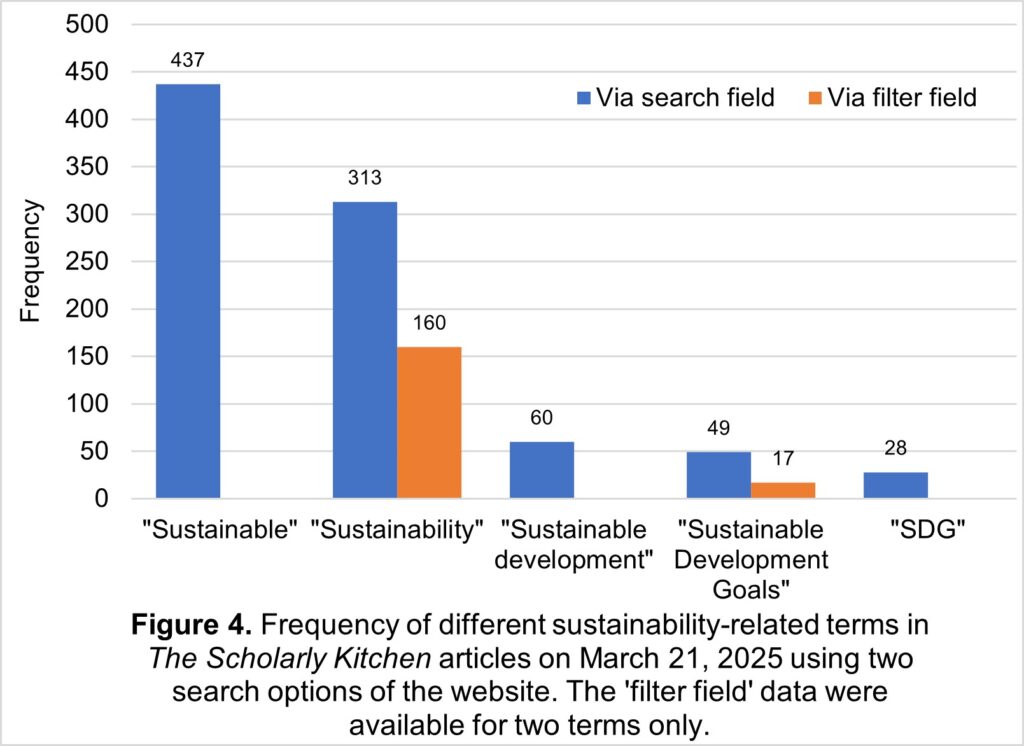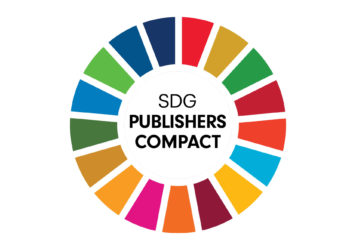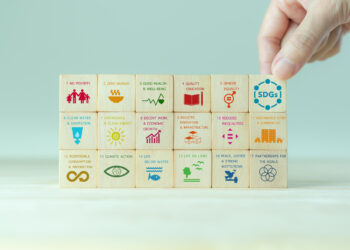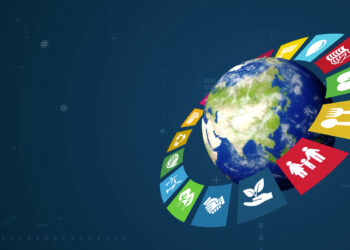In recent years, much has been written on sustainability, sustainable development, and the Sustainable Development Goals (SDGs), and their links with publishing industry. In this article, I present five specific developments which may give us an idea how the relationship between sustainability and scholarly publishers is changing over time.
1) COMMITMENT: Number of SDG Publishers Compact signatories is increasing rapidly.
The United Nations and the International Publishers Association (IPA) launched the SDG Publishers Compact in October 2020 in the Frankfurt Book Fair. Figure 1 shows that, over the last 32 months (July 2022 and March 2025), the number of signatories of the Compact in all regions has increased significantly. The growth ranges from 68% in Europe to 127% in Asia and the Pacific. I first wrote about the Compact in July 2022, before UN/IPA published their much delayed first progress report in October 2023. I strongly believe that publisher associations has an important role to play in leading SDG-related actions, and leadership and accountability are crucial for our sustainable future. Nevertheless, while the SDGs is a useful tool to work towards sustainability, we need to think beyond the SDGs, I argued in a recent post in EON.
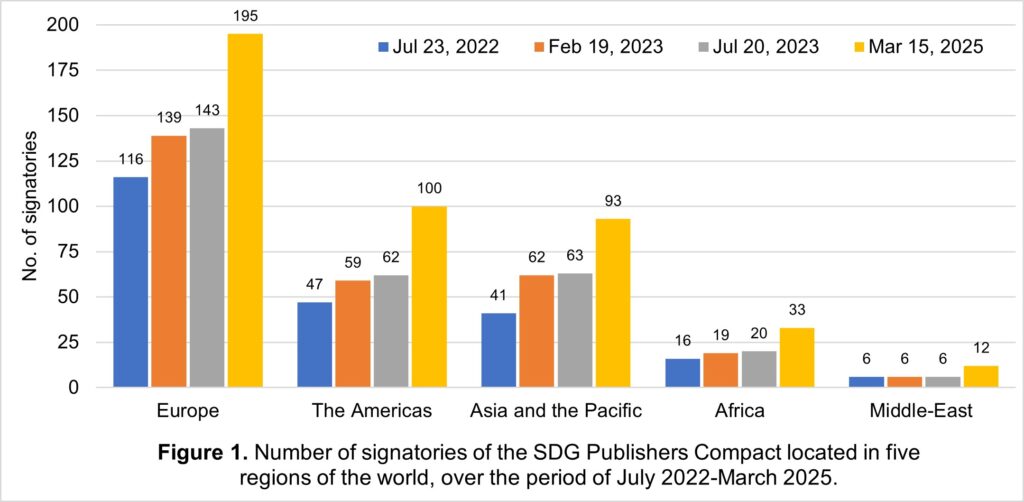
2) SUPPORT: IPA’s SDG Dashboard is a rich source of sustainability solutions.
Since its inception, the Dashboard has been a place to go for SDG-related practices and solutions. As Figure 2 shows, the climate action (SDG 13) section has always been rich, followed by responsible consumption and production (SDG 12), quality education (SDG 4), and reduced inequalities (SDG 10). To clarify, one content/solution may be mentioned under several SDGs. In some cases, as I noted in a recent article on nature conservation by scholarly publishers, not all of the content relevant to life on land (SDG 15) are found on the SDG 15 page. Therefore, proper tagging of new materials and revisiting the existing tagging are needed. Serious discrepancies can also be seen in the growth among the 17 SDGs. Half of the SDGs (i.e., SDGs 1, 2, 6, 7, 8, 14, 15, and 16) show very low amounts of content and virtually no addition of new content over the last 29 months. As the IPA progresses towards its 1,000 solutions target (291 solutions, as of March 21, 2025), it needs to address the above gaps.
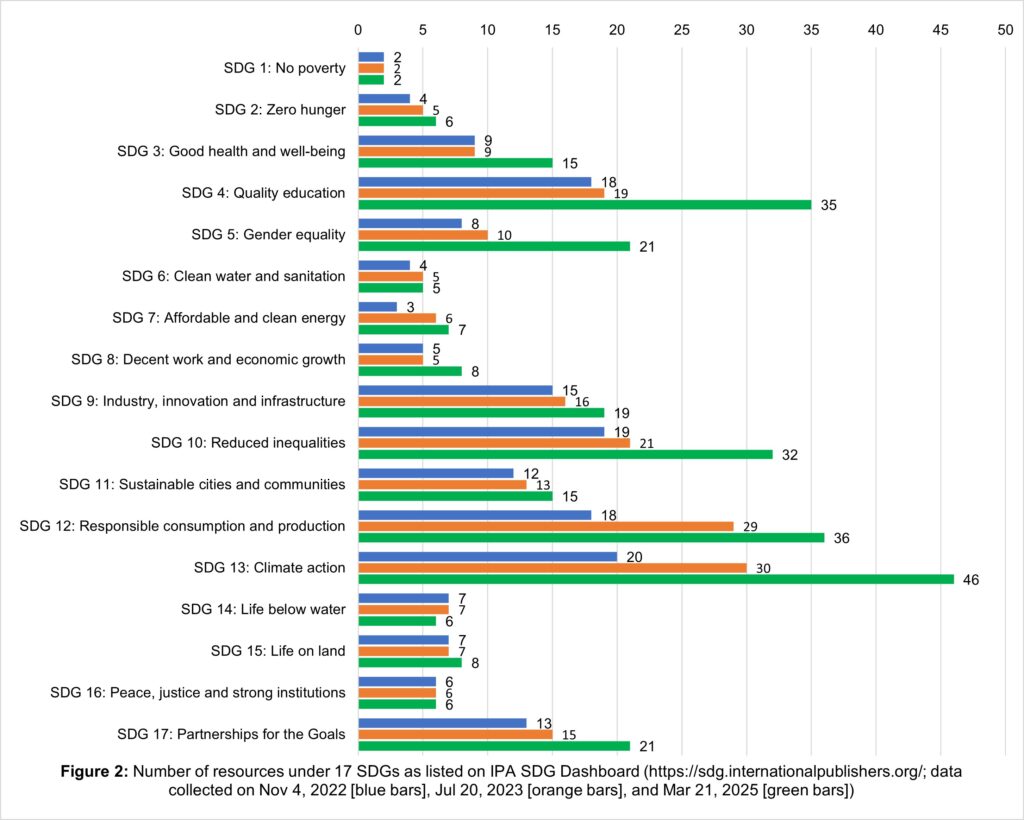
3) GOVERNANCE: Not many publishers’ associations have sustainability committees.
Only a few societies have designated committees on sustainable development, such as the SDGs and Publishing Special Interest Group of the Association of Learned and Professional Society Publishers (ALPSP) and the Environment and Sustainability Committee of the European Association of Science Editors (EASE). While the Council of Science Editors (CSE), International Society of Managing and Technical Editors (ISMTE), Open Access Scholarly Publishing Association (OASPA), and Society for Scholarly Publishing (SSP), for example, have vibrant committees on DEIA, early-career professionals, mentorship, and mental health, a committee focusing exclusively on sustainability is currently missing. However, on rare occasions, organizations like the STM Association have strong sustainability and climate action portfolio as a part of a ‘social responsibility’ strategic area supported by a committee. Given the increasing interest in sustainability and the SDGs, as shown in other sections of this article, associations should invest more in mainstreaming sustainability by incorporating it in their governance structure.
4) MAINSTREAMING: Associations’ annual events are increasingly highlighting sustainability.
Over the last more than four years, publishers’ associations have been leading from the front by providing space to discuss sustainability (Table 1). Some organizations (e.g., EASE) have been pioneers in that, by having sustainability as the conference theme; while others (e.g., CSE) have joined the campaign recently. Many organizations have had keynotes, panels, sessions, presentations, posters, and lightning talks on diverse aspects of sustainability since 2021. But, the Researcher to Reader Conference (R2R) is apparently the only event to have sustainability in all five annual meetings over the same period. These data and analyses only include activities whose titles directly cite sustainability-related terms. But we do understand that many presentations and conversations can directly address sustainability issues (e.g., DEIA) without uttering the exact term in the title or the abstract. A thorough content analysis of these events (proceedings and/or recordings) can show us how extensively and intensively sustainability/the SDGs is being discussed there, and how it is changing over recent times. Same could be done with numerous webinars on sustainability organized by may publishing organizations as a part of their regular year-round activities.
Table 1. Some major examples of sustainability appearing in associations’ annual events since 2021 as gathered by searching organizational websites on March 21, 2025. This mapping was constrained by an absence of easy access to past events on those websites.
| Assoc. | 2021 | 2022 | 2023 | 2024 | 2025 |
| ALPSP | Redux Conference theme was on diversity & sustainability | Annual meeting’s 1 session on taking action on sustainability | |||
| CSE | Annual meeting title: Communicating science for a sustainable future; 5 sessions & 1 poster on sustainability | ||||
| EASE | 15th conference title: Promoting sustainability in scholarly publishing: The role of editors | 18thconference’s 1 session on journal’s sustainability | |||
| ISMTE | Global Virtual Event’s 2 sessions on sustainable OA business models, and sustainable future beyond Plan S | Global Virtual Event’s 1 session on publishers’ route to implement sustainability | Global Virtual Event’s 1 session on leadership and accountability for sustainable publishing | ||
| OASPA | Annual meeting’s 1 poster lightning talk | Annual meeting’s 1 poster lightning talk | Annual meeting’s 2 panels on sustainability, justice, & resilience, and sustainability in Diamond OA; 4 poster lightning talks | ||
| R2R Conf. | 1 workshop on sustainability for transformative agreements | 1 workshop on sustainable monographs | 1 workshop on sustainability; 1 panel on sustainable OA models | 1 OA book workshop and 3 lighting talks on sustainability | 1 keynote on sustainability & integrity; 1 workshop on sustainable development in publishing |
| SSP | Annual meeting’s 1industry talk on sustainable OA agreements | Annual meeting’s 3 sessions on sustainability & OA, sustainability & equity in OA monographs, and trust in publishing for sustainable development; 1 industry talk on sustainability of events | |||
| STM | Annual conference’s 2 talks on sustainable Gold OA, and on the SDG |
5) COMMUNICATION: Learned Publishing shows moderate growth of articles on sustainability in publishing.
On March 21, 2025, I searched five different sustainability-related terms on the Learned Publishing journal website using the advanced search option. Two equal time periods (late 2016-2020 and 2021-early 2025) were used to compare changes in the frequencies of the selected terms, showing the years before the SDG Publishers Compact was declared in October 2020, and what has happened since (Figure 3). The terms ‘sustainable’ and ‘sustainability’ have always had high frequency (anywhere in the article), but the latter increased by almost 60% in the 2021-early 2025 period. On the other hand, although the SDG Framework was approved by national governments in the late 2015, its long and short forms did not appear in articles in the late 2016-2020 period. A few authors, however, found ‘sustainable development’ a bit more relevant to mention in their articles throughout the search period. Nevertheless, a very low appearance of ‘sustainable’ and ‘sustainability’ in article titles (together, only 7 appearances over 8.5 years) and a total absence of the other terms show overall very low attention to the subject matter. One way of increasing the interest among researchers, as Learned Publishing often does, to initiate an annual special issue on sustainability. The journal did so on resilience in January 2021.
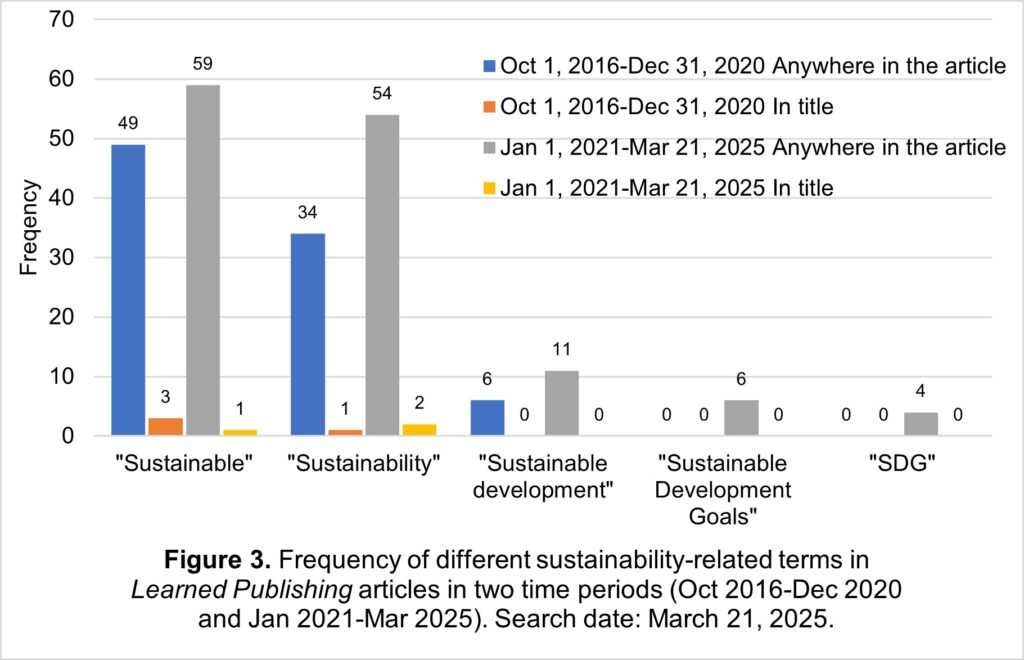
I also searched the same five terms on The Scholarly Kitchen using two search options (Figure 4). While ‘sustainable’ and ‘sustainability’ are quite frequent throughout the life of the Kitchen, other sustainability-related terms are slowly catching up. The frequent appearance of ‘Sustainable Development Goals’ in recent years is quite encouraging. This term first appeared on the Kitchenon September 8, 2016, when INASP’s Jonathan Harle explained in a guest post, why publishers should pay attention to the, then still new, SDGs. All these show that the Kitchen has been keeping its promise by highlighting emerging issues in the publishing ecosystem for its readers. Recently, it has arranged two commendable thematic series titled Mental Health Awareness Mondays, and Kitchen Essentials with industry’s infrastructure community. The Kitchen can make a similar attempt on sustainability to accelerate the ongoing conversations.
